eCommerce SEO: Drive Traffic to Your Store With Ease

What’s Inside
- What Is eCommerce SEO?
- How Does eCommerce SEO Work?
Important Read!
- What Are the Benefits of eCommerce SEO?
- Ready to dominate the search results?
- What Are the eCommerce SEO Best Practices?
- What Are the Ecommerce SEO Mistakes to Avoid?
- How to Analyze Your eCommerce SEO Strategies?
- Transform your website's SEO performance with headless architecture
- What Should Be Included in an eCommerce SEO Checklist?
- What Are the Tips for eCommerce SEO?
- Which Platform Is the Best for eCommerce SEO Websites?
- Stop struggling with SEO
- What Is the Future of SEO for eCommerce Sites?
- What Sets Experro Apart as a Complete Digital Experience Platform (DXP)?
- Don't settle for ordinary SEO
- Wrapping Up
Key Takeaways
- Mastering eCommerce SEO boosts online visibility, attracts organic traffic, and enhances sales potential.
- Prioritize keyword research, high-quality content, and structured data markup to optimize product pages and drive targeted traffic to your eCommerce site.
- Implementing technical SEO practices like page speed optimization and mobile responsiveness improves user experience and search engine rankings.
- Choose Experro for a comprehensive Digital Experience Platform (DXP) that streamlines content management and supports AI-powered product discovery. Additionally, it provides advanced analytics to optimize eCommerce SEO strategies effectively.
How can you bring visitors to your online store without paid ads and eCommerce SEO marketing?
The solution lies in mastering eCommerce Search Engine Optimization.
eCommerce SEO requires refining your website to align with search engine guidelines. It also involves adjusting your content to match your customer's search intent.
eCommerce businesses can benefit from SEO. These include increased website traffic, improved brand recognition, and increased sales. Understanding the effective approach to search optimization requires continuous adaptation.
So, let's make it easier for you to understand eCommerce SEO and dive deeper into how the SEO algorithm works.
What Is eCommerce SEO?
eCommerce SEO is the strategic improvement of online store visibility in search engine results. This involves various tasks, such as creating content that aligns with keyword search queries for search engines.
For example, a digital gadget store like Tech Trends can enhance its SEO by creating content on topics such as "how to troubleshoot common tech issues."
The primary goal of SEO is to attract more traffic by targeting users who search for products and brands related to the eCommerce store.
Additionally, eCommerce SEO involves enhancing page loading speeds and creating detailed meta description of products.
It also includes securing backlinks from authoritative websites. It drives online visibility and attracts valuable traffic.
Now, let's explore how it strategically boosts online store visibility and drives more traffic on Google's search results.
How Does eCommerce SEO Work?
eCommerce SEO strategically boosts online store visibility on SERPs, ultimately driving increased traffic. Achieving a high ranking is crucial for attracting visitors.
Unlike paid ads that incur costs per click, SEO enables you to garner relevant traffic at minimal expense.
Major other search engines such as Google, Bing, and Yahoo determine the ranking of your web store based on SEO factors.
Optimizing your website for Google search results is essential for boosting your web pages in SERPs.
Key factors include:
- Choice of relevant keywords targeting specific categories and product pages.
- Technical configuration of your web store.
- Mobile friendliness of your website.
These elements collectively impact your eCommerce SEO.
SEO ensures that the product pages rank among the top organic Google search results. This involves securing visibility on the first page of search engines like Google.
It's important to note that websites beyond the top 10 results receive significantly fewer visits. Only 0.63% of users click on page two listings, as reported by Backlinko. The top result on Google search results is 27.6% of all clicks.
To optimize eCommerce SEO effectively, it involves focusing on three critical aspects:
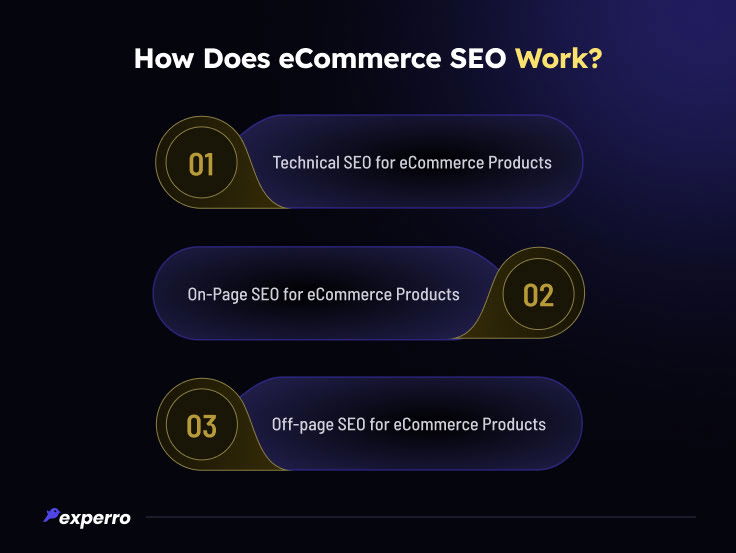
1. Technical SEO for eCommerce Products
Technical SEO involves optimizing the infrastructure of your website to help search engines crawl and index it more effectively.
For eCommerce sites, optimizing site and page speed and ensuring the site is mobile-friendly are essential for user experience and search rankings. Implementing SSL is crucial for security and enhancing customer trust.
Additionally, creating an XML sitemap and utilizing structured data (schema markup) can significantly improve how product listings appear in search results, making them more attractive to potential buyers.
Technical SEO also addresses eCommerce site architecture, such as a logical hierarchy and breadcrumb navigation, to improve user experience and site usability.
2. On-Page SEO for eCommerce Products
On-page SEO refers to optimizing individual product pages to rank higher in SERP and earn more relevant traffic.
In the context of eCommerce, this includes optimizing title tags, product descriptions, images, and other meta work.
eCommerce keyword research is crucial here; understanding and using informational keywords for your products can significantly impact your visibility in Google's search results.
Manage keyword difficulty by conducting thorough analysis and selecting strategic long-tail keywords aligned with your website's goals and target audience.
Additionally, optimizing headings (H1, H2, etc.) and ensuring content quality and uniqueness can help set your products apart from competitors.
3. Off-page SEO for eCommerce Products
Off-page SEO focuses on techniques outside your website that can influence your rankings within SERPs.
For eCommerce sites, building high-quality backlinks from reputable sites is one of the most impactful off-page SEO strategies.
Other effective strategies include eCommerce SEO campaign, social media marketing, influencer partnerships, and encouraging customer reviews.
These efforts help increase your site's authority and trustworthiness, which are key factors search engines use to rank pages.
Important Read!
Add a blockquote or a line in the end of this section - Want to know how does personalization reshape your SEO performance? Read here!
What Are the Benefits of eCommerce SEO?
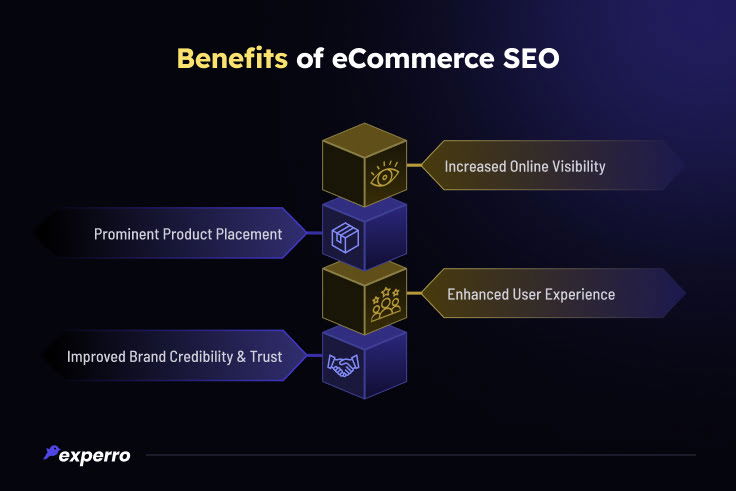
eCommerce SEO is a powerful strategy that enhances your online store's visibility, driving organic traffic and increasing sales.
By optimizing your site for search engines, you ensure that your products appear prominently in search results when potential customers search for them.
Let’s learn the advantages of eCommerce SEO in detail:
1. Increased Online Visibility
eCommerce SEO plays a pivotal role in elevating your online store's visibility across SERP. It ensures that your products are easily discoverable by potential customers.
With effective on page optimization strategies, your website can rank higher in search results. This heightened visibility not only expands your reach but also amplifies your chances of capturing the attention of qualified leads.
This ultimately leads to increased sales and revenue.
2. Prominent Product Placement
A key advantage of eCommerce SEO is the ability to secure prominent placement for your products in search engine results pages (SERPs).
Strategically optimize eCommerce site's product pages with a title tag and relevant keyword ideas. Craft a compelling title tag and meta description as per your keyword ideas and increase the probability of your products appearing at the top of SERP.
This ensures increased visibility when users are actively seeking similar products. This increased visibility enhances brand exposure, positioning your products as viable solutions to meet the needs of potential customers.
This, in turn, drives higher click-through rates and conversion rates.
3. Enhanced User Experience
eCommerce SEO goes beyond improving search engine rankings. It also focuses on enhancing the overall user experience of your website.
By implementing SEO best practices such as optimizing page loading speeds and streamlining navigation, you create a seamless browsing experience for visitors.
Ensuring mobile responsiveness further enhances eCommerce site accessibility, catering to users across various devices and improving overall user satisfaction.
This user-centric approach not only encourages users to explore your site further but also increases the probability of repeat visits.
Consequently, it fosters customer retention, ultimately contributing to long-term business success.
4. Improved Brand Credibility
A strong presence in search engine results not only drives traffic but also instills trust and credibility in your brand.
Higher keyword rankings are often associated with authority and expertise. This signals to potential customers that your brand is reputable and trustworthy.
By consistently appearing at the top of results for relevant search queries, you establish your brand as a leader in your industry. This fosters positive perceptions and builds lasting relationships with your audience.
For more insights into how eCommerce SEO can benefit your business, check out our detailed blog on eCommerce SEO Benefits.
What Are the eCommerce SEO Best Practices?
For eCommerce site structure, optimizing speed is fundamental to providing a positive user experience and boosting search rankings.
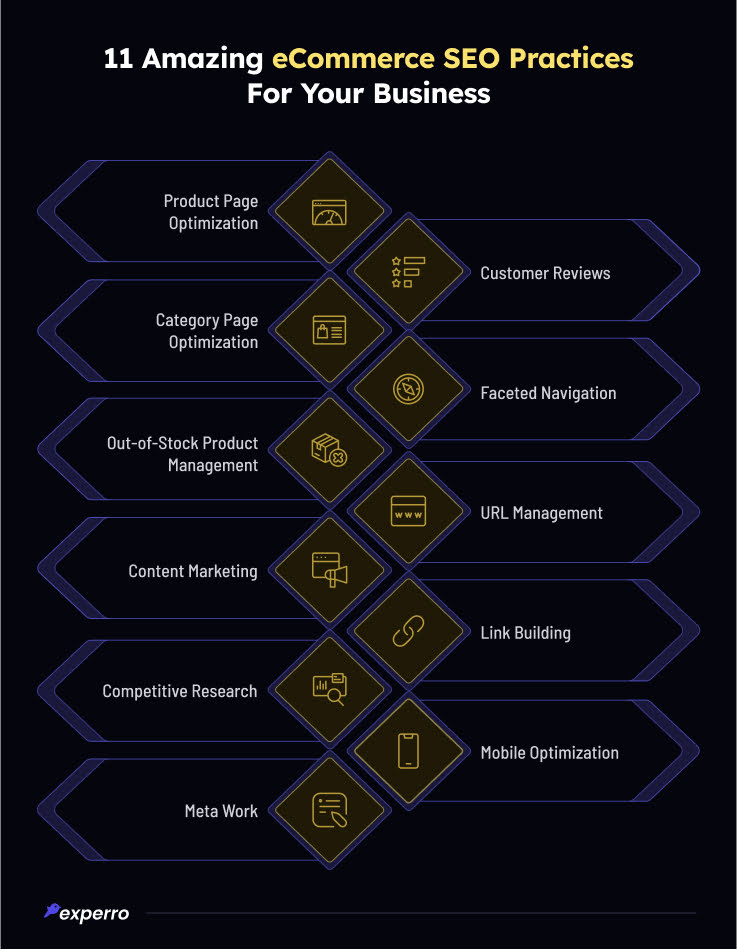
Let’s learn the eCommerce SEO best practices in detail:
1. Optimizing Product Pages for Better Reach
Enhance product pages with high-quality images, detailed descriptions, and targeted long tail keywords to improve visibility and attract potential customers.
This practice is essential for showcasing each product's unique value and making pages more relevant to search queries.
2, Optimizing Category Pages to Rank Better in SERP
Incorporate relevant keywords, compelling content, and clear structure in your eCommerce category pages to boost their ranking in search engine results pages (SERPs).
A well-optimized category page is a gateway to your products, improving navigation and user experience based on search intent.
3. Managing Out-of-Stock Products to Guide Customer Choices
Instead of removing out-of-stock product pages, provide options to be notified when products are back in stock.
This approach retains the SEO value of the page and guides customers to make choices or return later.
4. Content Marketing to Engage and Convert Customers
Create valuable and relevant content that addresses your audience's needs and interests.
Content marketing can attract new visitors, establish your brand's authority, and lead customers through the buying process.
5. Conducting Competitive Research for Content Analysis
Analyze competitors' content strategies to identify gaps in your content and discover new opportunities.
Understanding what works well for competitors can inspire improvements and innovations in your content marketing efforts.
6. Optimizing Meta Title Tag and Descriptions for Featured Snippets
Craft compelling title tag and meta descriptions with target keywords to increase the chances of your content being featured in snippets.
Featured snippets provide greater visibility on the search results page and can drive more traffic to your site.
7. Leveraging Customer Review for Trust Building
Encourage and display customer reviews on product pages to build trust and credibility.
Positive reviews can influence buying decisions and improve your site's SEO by adding fresh, relevant content.
8. Managing Faceted Navigation to Prevent Duplicate Content
Configure faceted navigation on eCommerce sites to avoid creating duplicate content.
Using the right URL parameters and canonical tags can help search results understand which pages to index, preserving the SEO value of your site.
9. Effective URL Management for More Visits
Create clear, concise, and descriptive URLs with relevant target eCommerce SEO keywords for better search engine indexing and user understanding.
Well-structured URLs can improve site hierarchy and help users navigate your site more effectively.
10. Link Building and Internal Linking for Better SEO
Develop a strategy for acquiring high-quality external links and optimizing internal linking within your site.
These practices can enhance your site's authority, improve page rank, and guide visitors to relevant content.
11. Mobile Optimization to Make Your Website User-Friendly
Ensure your website is mobile-friendly with responsive design and fast loading times to meet the needs of mobile users.
With the increasing prevalence of mobile searches, mobile optimization is crucial for improving user experience and SEO.
For a deeper dive into the practices and detailed recommendations of eCommerce SEO, consider exploring our blog post on eCommerce SEO best practices, to further optimize your online store's performance.
What Are the Ecommerce SEO Mistakes to Avoid?
In the United States, 268 million people buy things online. Experts predict that this number will soon increase to 285 million.
That's a whole lot of online shoppers.
Boosting traffic is an essential goal in SEO for eCommerce businesses, while navigating the complexities of eCommerce search engine optimization can be daunting, and mistakes are common.
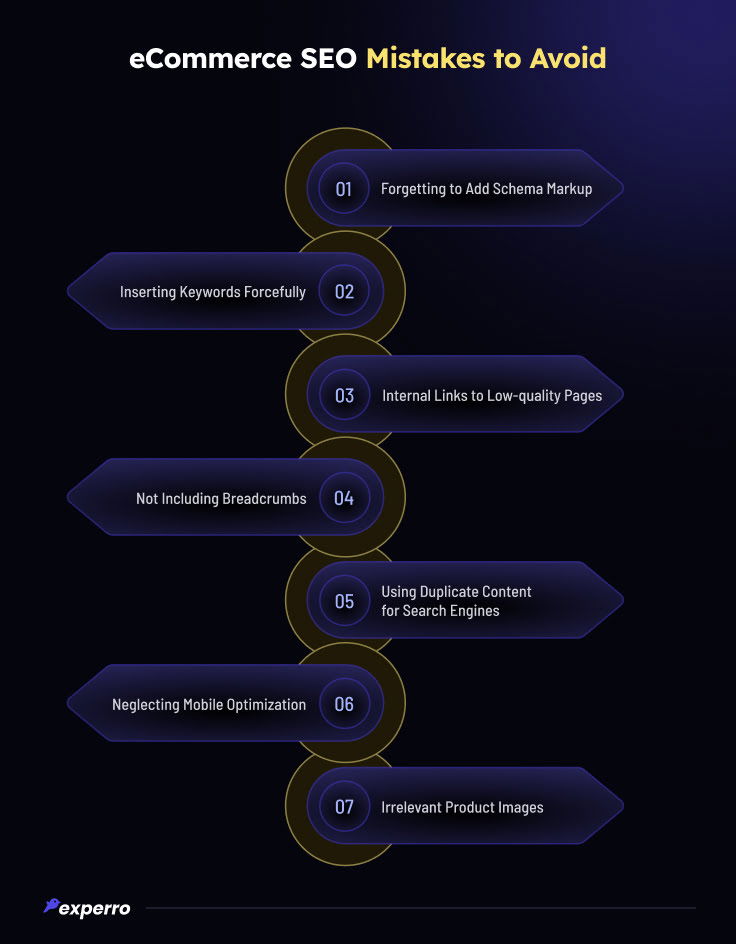
Here, we delve into some common pitfalls and provide eCommerce SEO tips to help your eCommerce store achieve its full potential.
1. Forgetting to Add Schema Markup
Schema markup is an advanced SEO for eCommerce website technique that many overlook. By neglecting to implement this structured data, businesses miss out on the opportunity to enhance their product listings in search results.
It makes them less attractive to potential customers. Consulting with an eCommerce SEO expert or partnering with the best eCommerce SEO company can ensure your products shine in SERPs.
2. Inserting Keywords Forcefully
While keywords are the backbone of SEO eCommerce, their overuse or forceful keyword stuffing can do more harm than good.
The best eCommerce SEO emphasize the importance of smoothly inserting long tail keywords into product descriptions, title tags, and content to maintain readability and user engagement.
Remember, the best eCommerce SEO practices support a customer-first approach.
3. Internal Links to Low-quality Pages
Internal links are essential for connecting different pages within a website using target keywords. They support a website by improving navigation and enhancing overall user experience.
The quality of internal linking in your eCommerce website's SEO matters significantly. Linking to low-quality pages can diminish your site's credibility in search engines.
An eCommerce SEO audit can help identify and rectify such issues, ensuring a network of high-value, relevant internal links that boost your site's authority.
4. Not Including Breadcrumbs
Breadcrumbs is a user navigation aid and a valuable element in technical SEO for eCommerce stores.
They help search engines understand the structure of your eCommerce site. A lack of breadcrumbs can lead to a better user experience and help your site's SEO performance.
5. Using Duplicate Content for Search Engines
The temptation to reuse content across product pages is understandable, but it's a major eCommerce SEO mistake.
Search engines penalize duplicate content, which can affect your site's visibility. Creating unique content for each product is crucial in SEO for eCommerce websites.
6. Neglecting Mobile Optimization
Most online shoppers use mobile devices. Thus, the optimization for mobile has become a cornerstone of SEO for large eCommerce sites.
A mobile-friendly eCommerce website ensures a seamless shopping experience. It is crucial for retaining customers and improving search volume. Engaging with an eCommerce SEO firm can help optimize your site for mobile users.
7. Irrelevant Product Images
Product images play a critical role in the consumer decision-making process. Using irrelevant or low-quality images can negatively impact your eCommerce product SEO.
Conducting keyword research and ensuring all images are high-quality, relevant, and optimized for Google search results can positively impact your eCommerce product SEO.
Avoiding these common mistakes requires a thorough understanding of eCommerce SEO strategies.
Whether conducting an eCommerce SEO audit or developing a new SEO strategy for eCommerce websites, remember the importance of detailed attention to these areas.
Consulting with eCommerce SEO agencies or hiring an eCommerce SEO specialist can provide the expertise needed to navigate these challenges effectively.
Ultimately, the goal is to avoid mistakes and embrace eCommerce SEO best practices that drive traffic, engagement, and conversions.
How to Analyze Your eCommerce SEO Strategies?
Engaging with a top eCommerce SEO platform can help develop a robust eCommerce SEO strategy, focusing on technical SEO issues, On page optimization, and Off-page optimization.
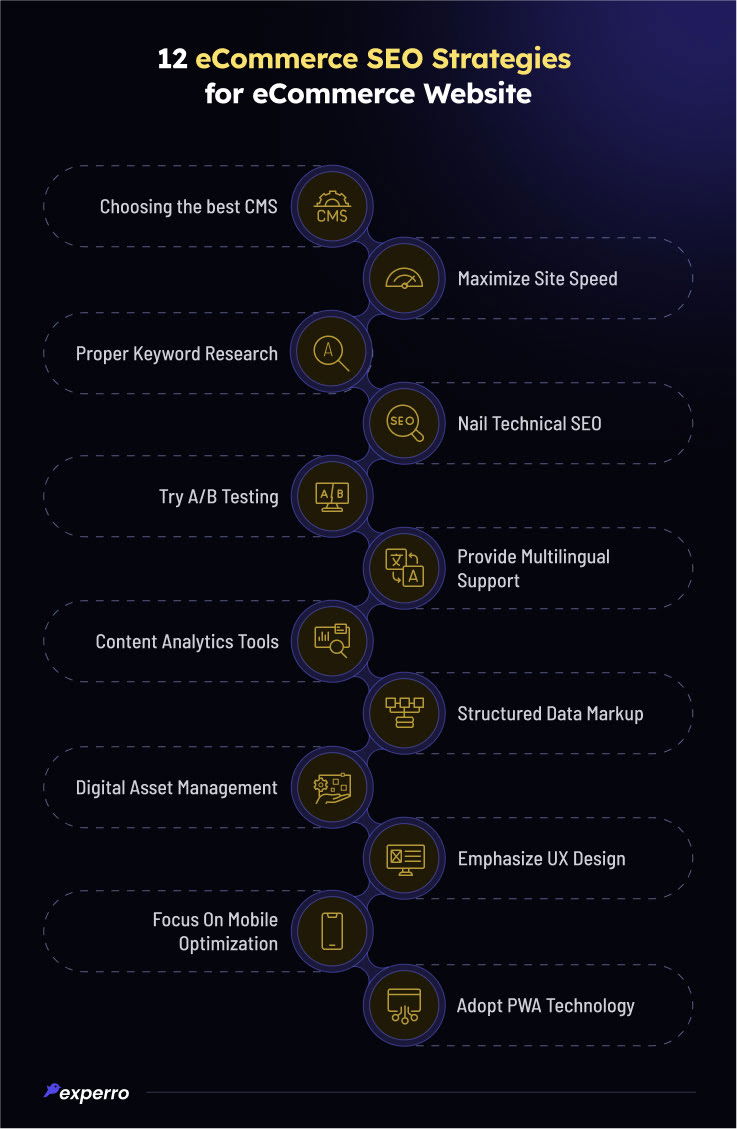
Let’s learn the eCommerce SEO strategies in detail:
1. Choosing the Most Suitable CMS
The foundation of an effective eCommerce website SEO strategy begins with selecting the right Content Management System (CMS) that supports SEO best practices.
A CMS optimized for eCommerce SEO can significantly influence your site's visibility and ranking on search engines, making it a crucial choice for any eCommerce business aiming to leverage eCommerce search engine optimization.
2. Maximize Site Speed
Site speed is a critical factor for eCommerce SEO, impacting both user experience and search engine rankings.
eCommerce sites should aim to enhance their site speed for better SEO results, as faster loading times lead to improved user engagement and higher conversions, highlighting the importance of technical SEO for eCommerce.
3. Keyword Research
In eCommerce SEO, strategic keyword research is the cornerstone for optimizing product visibility and driving conversions.
It involves identifying high-intent keywords relevant to your products or services, optimizing product listings, and enhancing visibility in search engine results.
4. Technical SEO
Technical SEO is paramount in eCommerce strategies, ensuring website performance, crawlability, and indexability.
By optimizing site speed, fixing crawl errors, and implementing structured data markup, businesses can enhance user experience and search engine rankings, driving more traffic and conversions.
5. Conduct A/B Test
Conducting A/B tests can provide valuable insights into the best eCommerce SEO practices by comparing different versions of a page to see which performs better in search rankings and user engagement.
This approach is essential for eCommerce sites looking to refine their SEO strategies and enhance their overall eCommerce search engine optimization.
6. Multilingual Support
Implementing multilingual support as part of your eCommerce SEO strategy can significantly expand your market reach and improve your site's visibility in different linguistic and geographical search results.
It highlights the benefits of eCommerce SEO by making your site accessible to a broader audience.
7. Content Analytics Tools
Utilizing content analytics tools allows eCommerce businesses to measure the effectiveness of their SEO content, offering insights into areas for improvement and optimization.
This practice is key to developing a successful eCommerce SEO strategy, ensuring content is aligned with SEO goals and audience needs.
8. Structured Data Markup
Incorporating structured data markup enhances eCommerce SEO by making it easier for search engines to index and understand the content of your site, improving visibility in search results.
It's a technical SEO for eCommerce strategy that can lead to richer search results and better user experience.
9. Digital Asset Management
Effective management of digital assets, including images and videos, can significantly impact your eCommerce SEO.
By optimizing these assets, you can improve page load times and enhance user experience, which are key factors in SEO for eCommerce websites.
10. User Experience (UX) Design
UX design plays a pivotal role in eCommerce SEO by ensuring that your website is not only search engine friendly but also provides a seamless and engaging experience for users.
A well-designed UX can lead to higher retention and conversion rates, which are crucial for the success of an eCommerce SEO campaign.
11. Prioritize Mobile Optimization
With the increasing prevalence of mobile shopping, mobile optimization has become essential for eCommerce SEO.
Ensuring your eCommerce site is mobile-friendly can greatly improve search rankings and cater to the growing segment of mobile users, making it a top priority for any eCommerce SEO agency.
12. Progressive Web App (PWA) Implementation
Implementing Progressive Web Apps (PWAs) can enhance the mobile user experience, offering fast, app-like interactions.
The eCommerce PWA plays a significant role in mobile optimization for eCommerce SEO, providing a boost in speed and engagement that can positively impact search rankings and user satisfaction.
Analyzing your eCommerce SEO strategies is crucial for enhancing your online store's visibility and performance on search engines.
What Should Be Included in an eCommerce SEO Checklist?
Creating an eCommerce SEO checklist is essential for ensuring your online store is optimized to attract more organic traffic and convert visitors into customers.
Here's a brief checklist that incorporates many of the key terms related to SEO for eCommerce:
✅ Ensure mobile responsiveness, secure your eCommerce site with SSL, and create a clear XML sitemap.
✅ Use relevant eCommerce SEO related keywords in product titles, and descriptions, and optimize images with alt text.
✅ Engage in off-page SEO strategies by building high-quality backlinks to increase your site's authority.
✅ Regularly audit your eCommerce site to identify and fix issues, optimizing for better performance.
✅ Collaborate with an SEO agency for eCommerce or eCommerce SEO consultants for tailored strategies and insights.
✅ Keep up with the best practices and adjust your eCommerce SEO strategy based on performance data and industry trends.
Read our recent blog for more insights and a detailed breakdown of each point in the eCommerce SEO checklist. It offers deeper dives into the checklist to further enhance your eCommerce SEO efforts.
What Are the Tips for eCommerce SEO?
Optimizing your online store with eCommerce SEO is vital, and leveraging eCommerce SEO services from a reputed platform can significantly enhance your visibility.
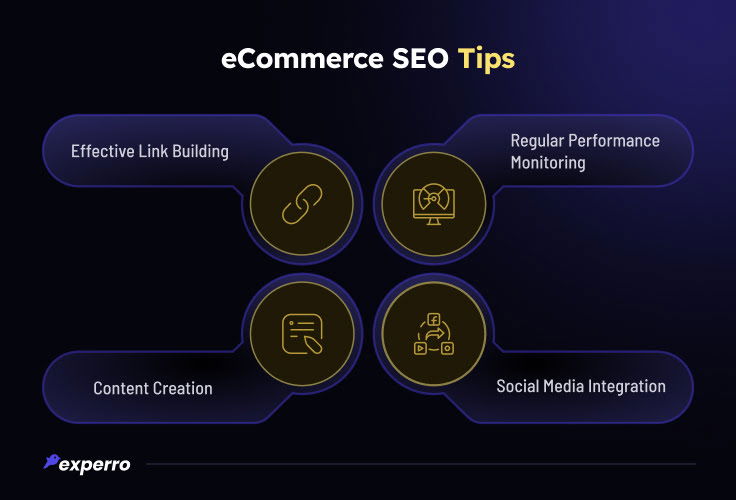
Let’s learn the eCommerce SEO tips in detail:
1. Effective Link Building
According to a recent survey, 41% of SEO experts find link building to be the most demanding aspect of search engine optimization for eCommerce.
Acquiring high-quality backlinks boosts your site's authority and trustworthiness with search engines. Focus on link building that adds value to your website and avoids black hat tactics like buying links.
Engage in outreach efforts, guest blogging, and partnerships to secure backlinks from authoritative sources within your industry.
Effective link building can significantly boost your site's visibility and organic search rankings over time.
2. Regular Performance Monitoring
Monitoring the performance of your eCommerce website is essential for identifying areas of improvement and optimizing your SEO strategy.
Regularly track key performance metrics such as organic traffic, keyword rankings, conversion rates, and bounce rates.
Utilize analytics tools like Google Analytics and Google Search Console for comprehensive insights into the performance of your category pages.
Analyze the data to identify trends, detect issues, and make informed decisions to enhance your site's SEO performance. By continuously monitoring your website's performance, you can adapt your strategy to algorithm updates.
3. Content Creation
Creating high-quality, relevant content is fundamental to eCommerce SEO success. Develop engaging and informative content that addresses the interests of your target audience.
Utilize blog posts, product guides, tutorials, and videos to provide valuable information and attract organic traffic to your website.
Incorporate relevant keywords naturally into your content to improve search visibility and drive traffic to your product pages. Regularly update your content to keep it fresh and relevant, demonstrating your expertise and authority in your niche.
Quality content not only helps improve your search rankings but also engages your audience and drives conversions.
4. Social Media Integration
Integrating social media into your eCommerce SEO strategy can amplify your online presence.
Leverage popular social media platforms such as Facebook, Instagram, Twitter, and Pinterest to share your content, product updates, and promotions, and engage with your audience.
Encourage social sharing and user-generated content to expand your reach and enhance your brand visibility.
By building a strong social media presence and actively engaging with your audience, you can increase brand awareness, drive website traffic, and improve your site's SEO performance.
To know more about the tips for eCommerce SEO, explore our in-depth blog that covers every aspect you need to know.
Which Platform Is the Best for eCommerce SEO Websites?
Choosing the best eCommerce platform for SEO hinges on features that bolster eCommerce SEO efforts. Platforms excelling in SEO for eCommerce enable effective eCommerce search engine optimization strategies.
It should support and enhance the online visibility of the sites through target keyword stuffing and quality content.
The ideal platform like Experro supports all aspects of SEO for eCommerce websites, from technical SEO for eCommerce to optimizing product and category pages.

Here are some of the best eCommerce SEO platforms:
1. Experro: A digital experience platform focusing on delivering customized online experiences.
2. BigCommerce: An open SaaS ecommerce platform that empowers businesses to build and scale their online stores.
3. Shopify: A comprehensive ecommerce platform that allows individuals and businesses to create and manage their own online stores.
4. Magento: An open-source ecommerce platform known for its flexibility, allowing businesses to customize and extend their online store capabilities.
5. WooCommerce: A customizable, open-source ecommerce plugin for WordPress, designed for small to large-sized online merchants.
6. SquareSpace: An all-in-one website building platform that enables users to create elegant websites and online stores with easy-to-use templates and design tools.
For an in-depth look at platforms that excel in SEO capabilities, consider exploring our dedicated blog on the best eCommerce SEO platforms.
What Is the Future of SEO for eCommerce Sites?
The future of eCommerce SEO is shaping up to be an integral part of digital marketing strategies.
Digital marketing helps to generate organic traffic that directly contributes to 23.6% of eCommerce orders.
Businesses are increasingly recognizing the importance of SEO for eCommerce. Thus, optimizing their eCommerce stores for better visibility and engagement.
As eCommerce continues to evolve, so does the approach to SEO. emphasizing the need for specialized eCommerce SEO efforts. Here’s what to anticipate:
- eCommerce website SEO will increasingly use AI and machine learning for personalized search experiences, driving data-driven strategies.
- Voice assistants and visual search will become essential for eCommerce SEO, demanding on page optimization efforts in these areas.
- Technical SEO in eCommerce will prioritize site architecture, mobile optimization, site speed, and user experience for higher search volume.
- Focusing on content marketing tailored to eCommerce SEO will attract and retain customers effectively.
- eCommerce SEO experts must build sustainable, trustworthy brands with ethical SEO practices that align with consumer values.
- SEO strategies for eCommerce sites will integrate with social platforms, blurring the lines between traditional search engines and social media.
What Sets Experro Apart as a Complete Digital Experience Platform (DXP)?
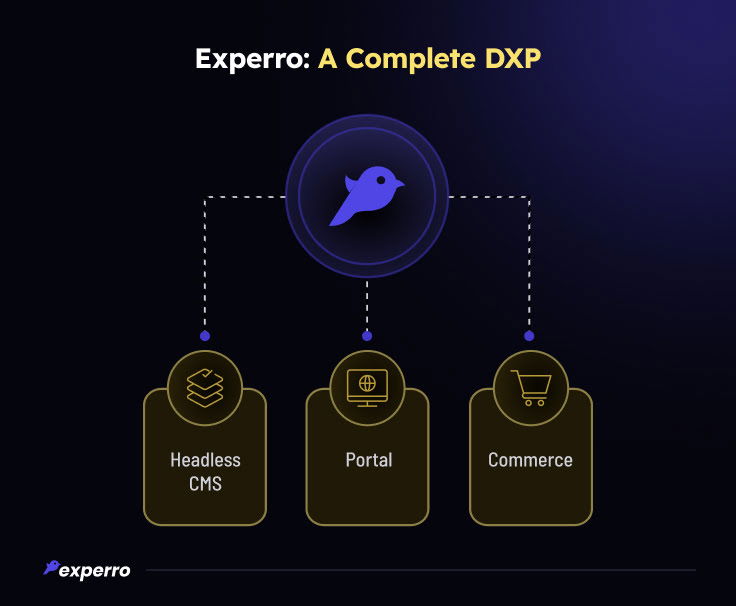
Experro stands out for its unique features that make creating and managing digital content easier and more effective.
Its headless site architecture allows for fast updates and supports AI-powered product discovery. With its easy-to-use Visual Website Builder and a central place for all your content, it's simple for anyone to create and update websites without technical skills.
Experro also offers features like A/B Testing and detailed analytics to help you understand what works best for your audience and improve your strategies.
Plus, with the ability to manage different environments, Experro provides a flexible platform that supports the SEO for large eCommerce sites, aiming to enhance their online presence.
Additionally, Experro boosts your digital strategy with advanced digital merchandising and insights. This enables you to tailor your content and product offerings to meet customer's search intent and demands effectively.
The platform's integrated alerts and notifications keep you informed of important updates, ensuring you're always ahead of the curve.
Experro supports businesses in navigating the digital landscape with confidence, making it an ideal choice for those looking to streamline their digital experience management.
Wrapping Up
In summary, mastering eCommerce SEO is essential for online stores to thrive. It fine-tuns technical aspects like website speed and mobile friendliness, smart keyword research SEO tools, and content strategies.
Focusing on these elements and understanding how SEO and eCommerce marketing can help businesses boost their online visibility and attract more customers.
Ultimately, prioritizing eCommerce SEO helps businesses stand out in the crowded digital marketplace and drives more sales.
With the right approach, including a thorough eCommerce SEO checklist, you can improve your rankings and ultimately boost sales on your SEO eCommerce site.
Stay tuned to learn more! Or schedule a call with our sales team.
FAQs


Pallavi Dadhich
19 June 2024Pallavi is an ambitious author known for her expertise in crafting compelling content across various domains. Beyond her professional pursuits, Pallavi is deeply passionate about continuous learning, often immersing herself in the latest industry trends. When not weaving words, she dedicates her time to mastering graphic design.